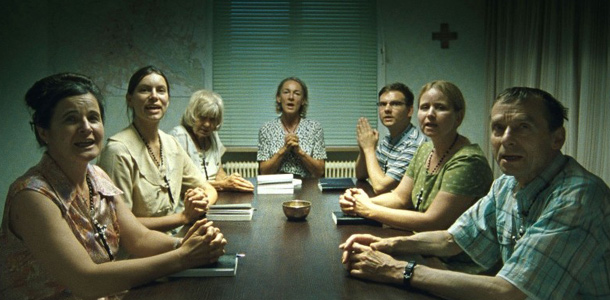Between Love and Hope: Seidl’s Second Film of Paradise Trilogy a Harrowing Hilarity
Anna Maria (Maria Hofstatter), sister of Teresa, the Kenyan sex tourist protagonist of Paradise: Love, is about to take a vacation herself, though she’ll be staying at home and engaging in her own missionary style work with the denizens of lower income housing. While working as a radiologist’s assistance, Anna Maria has recently found her faith again, and the practice of it basically rules her life. We first meet her flagellating her naked torso while she begs Jesus on the cross for forgiveness because she had been unchaste recently (though we don’t exactly find out how). At night, she talks to a framed 5X7 of Jesus, cooing at how handsome he is, kissing the glass. Belonging to a devoted prayer group determined to make Austria Catholic again, Anna Maria totes large statues of the Virgin Mary as an icon to drop off at houses of the less fortunate. These interactions range anywhere from the strangely banal to the alarmingly uncomfortable. Suddenly, out of nowhere, her husband, Nabil (Nabil Saleh), a Muslim who became paraplegic after an undisclosed accident, returns home. Expecting a warm welcome after his two year absence, he finds Anna Maria completely changed. Refusing to share a bed with him, tensions between them rise immediately, and Anna Maria is convinced her almighty lord is testing her.
Faith ends up feeling a lot more satirical than Love, and we’re invited to laugh freely at the absurdity of Anna Maria, whose witch-like visage and hair spray smothered up-do make it hard for us take her seriously, unlike the almost operatically dismal search for love by the comparatively pathetic Teresa. It’s evident that Seidl most likely envisioned the character of Anna Maria from his 2004 documentary, where one of the women lives a similar scenario. Curiously, it’s Anna Maria who is seen as the more deranged fundamentalist, her Muslim husband appearing staunchly reasonable with his own belief system, but Seidl’s intent is not to champion one religion over another. Instead, in his exploration of what people do to seek happiness and fulfillment while on earth, he shows us the dangerous, innate addiction we have in owning, championing, and proving to others what it is that makes us happy, the right way to think, and the right way to live life.
Anna Maria’s oblivious overzealousness is awash in fanaticism—she’s addicted to religious worship, her behaviors the result of her dangerous addiction. Seidl thankfully doesn’t shy away from the aberrant sexual behaviors exhibited by those who repress their innate desires, and Anna Maria’s stumbling into a lurid park orgy (clearly a metaphor for “straying from the path” when she treads backwards and into the bushes) features a scene not unlike Edward Woodward’s nighttime experiences with the pagans in The Wicker Man.
As with all of Seidl’s cinema, there are no clear cut interpretations of what he’s trying to say or do. The often static camera simply observes, projecting the strange, idiotic moments back to us. Maria Hofstatter, who has worked with Seidl several times over the past decade, disappears adamantly into Anna Maria, truly one of those characterizations that’s mind boggling in its power to evoke sadness and laughter at the same time. Both Hofstatter and Nabil (who is not paraplegic) engage in admirable moments of physicality, slapping, hitting, rolling around on the ground, clawing and hollering. And one extended sequence where Anna Maria wrestles around with a drunken Russian prostitute is both hilarious and nerve-wracking. But Seidl’s most daring coup d’état yet has Anna Maria indulging in bedtime pleasures by masturbating herself with a statue of Jesus on the cross. Without the forgiving cushion of genre, this delightfully blasphemous, utterly hilarious moment says more than any words possibly could concerning the warping power of blind faith and the sickness of utter devotion.
While some may consider Seidl an acquired taste, his cinema, which many consider judgmental and off-putting, does often depict an inevitable, inescapable, and ugly degradation of life. As it stands, Paradise: Faith happens to be one of the darkest, funniest, and delightful films of this year. While we are still awaiting the last installment, Paradise: Hope, Seidl’s trilogy will definitely stand as one of the most accomplished cinematic achievements of the decade.
Reviewed on November 03 at the 2012 AFI Film Festival – WORLD CINEMA Programme.
113 Min
